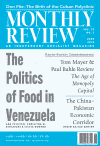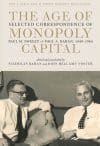Volume 70, Issue 02 (June 2018)

With the eruption in March of the scandal around Cambridge Analytica and Facebook, articles raising the alarm on “surveillance capitalism” are suddenly everywhere. The term, which was coined in MR in August of 2014, was developed to highlight the links between digital spying systems and contemporary capitalism as a whole. Academic interpretations of the concept effectively divorced surveillance capitalism from class analysis, and from the overall political-economic structure of capitalism—as if surveillance could be abstracted from monopoly-finance capital as a whole. | more…

Few countries and political processes have been subject to such scrutiny, yet so generally misunderstood, as Venezuela and the Bolivarian Revolution. This is particularly true today, as the international media paints an image of absolute devastation in the country, wrought by failed policies and government mismanagement. One way to comprehend the complexities of what is happening in Venezuela today—missed entirely by the dominant, mainstream narrative—is by homing in on the dynamics around Venezuela’s most highly consumed staple foods. | more…

During the 1960s, Cuban medicine experienced changes as tumultuous as the civil rights and antiwar protests in the United States. While activists, workers, and students in western Europe and the United States confronted existing institutions of capitalism and imperialism, Cuba faced the even greater challenge of building a new society. | more…

Beyond the Rule of Capital?
Three hundred years after what became known in the nineteenth century as the Great Game—a struggle for regional hegemony between the British and Russian Empires—Southwest Asia remains an imperial staging ground. The U.S. invasion of Afghanistan in September 2001 signaled Washington’s desire to cement its hegemonic position, but seventeen years later it is mired in an unwinnable war, even as the U.S. economy—and that of much of the Western world—endures the “endless crisis” of contemporary capitalism. | more…

Paul A. Baran (1910–1964) and Paul M. Sweezy (1910–2004) were two of the most creative and influential Marxist economists of the last century. The Age of Monopoly Capital collects hundreds of letters between Baran and Sweezy, written between 1949 and Baran’s death in 1964. The correspondence contains numerous interesting, important, and unanticipated ideas. Nuggets of wisdom about economic theory, socialist history, dialectical method, academic politics, and many other topics are scattered throughout. | more…

Instead of theory, early U.S. radicals excelled in reportage, like John Reed’s Ten Days That Shook the World, or fiction, like Upton Sinclair’s packing-house shocker The Jungle. To Europeans American thought seemed impermeable to the difficult ideas of Marxism. That changed with the founding of Monthly Review in 1949, which marked a newly realized if not entirely new trend in American Marxist thought. | more…





